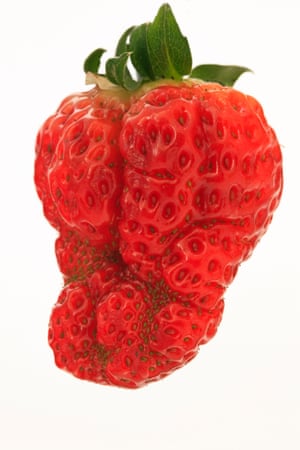Catalan project harvests unwanted fruit and veg for people in need
Barcelona-based Espigoladors sends volunteers into the fields to pick leftover produce for distribution to the vulnerable and unemployed
Misshapen potatoes. Lumpy lemons. A butternut squash that’s curved in all the wrong places. These are the rejects of the food chain – the produce that rarely makes it to consumers, weeded out for cosmetic reasons.
However, a project in Spain is embracing these rejects, diverting them from the bin and, instead, putting them on plates.
“We created this project to give dignity to those using leftover produce,” says Mireia Barba, one of the three co-founders of Barcelona-based Espigoladors.
For the past year, the project has been in touch with farmers across the north-east region of Catalonia, offering to send volunteers to pick produce that has been left in the fields for reasons of aesthetics, ripeness or low sales.
The volunteers are recruited through social services, often people who are out of work or struggling to make ends meet. Espigoladors sends groups of 10-20 people to farms where they spend a few hours collecting leftover produce. They can take home as much as they like. The remaining produce is taken to community kitchens.
“People email us and tell us that they’re out of work and in a vulnerable situation. They don’t want to go to a church or a food bank – they come to us,” says Barba.
About 30 producers and distributors have signed up to the Espigoladors project. They call with as little as 24 hours’ notice when they have leftovers to be harvested. These donations usually start at about 200kg, says Barba.
Rebeca Segura called Espigoladors last month. Her group, Desos, a cooperative that runs organic farms in Sant Boi de Llobregat, near Barcelona, had been left with about 50kg of radishes after a client rejected them. “They weren’t round and perfect,” says Segura.
Initially, Desos had tried to get rid of the radishes on their own. “We handed them out to our family, friends, anyone who would take them,” Segura says. “But, eventually, you get to a point when everyone you know has their fridge filled and it seems like there’s no alternative but to let them go to waste.”
If the team from Espigoladors hadn’t come to pick the radishes, they would have been left in the ground, says Segura, echoing a conundrum familiar to many producers who point to cost and effort as barriers to donating leftover produce. “It would take hours of work to harvest them. Probably, we wouldn’t have even bothered, we would have just left them in the ground to rot.”
In Spain, about 7.7 million tonnes of produce – roughly 163kg per person – are thrown away each year, says Barba. In its first year, Espigoladors has managed to recover about 70,000kg of produce.
Central to the ethos of Espigoladors is a desire to build a bridge between producers, who say they have no alternative to the bin for leftover produce, and the many families in Spain who are reeling from the economic crisis.
The project was inspired by a friend’s tale of nightly rummaging through the bin of a grocery store. “She was unemployed and had two children and this store was throwing out produce that consumers didn’t want, even though it was in perfect condition,” says Barba.
Job creation is another aim. A small percentage of the produce collected is set aside to be made into soups, jams and juices, which are sold under the brand Es Im-perfect (it’s imperfect).
“The name is a declaration of our intention,” says Barba. “It’s a brand that aims to provide value to leftover, imperfect and ugly food.”
Es Im-perfect employs three people and has plans to expand operations in the coming year. Its products are sold across Catalonia, with profits being funnelled back into Espigoladors to cover expenses such as transportation costs.
Underpinning much of the work of Espigoladors is the push to detangle aesthetics from the idea of what is edible. Barba and her team often hold workshops for various groups and children, passing around photos of three-headed lemons and potatoes shaped like hearts. “Children find it hilarious,” she says. “They’ve never seen anything like it, because all of the products in the supermarket look the same.”
The project operates around Barcelona, but is expanding to other areas of Catalonia. The organisers hope the idea will spread across Spain as an antidote to the huge amount of food that is being wasted. “At times, we’re collecting a tonne in a morning.”







Δεν υπάρχουν σχόλια:
Δημοσίευση σχολίου